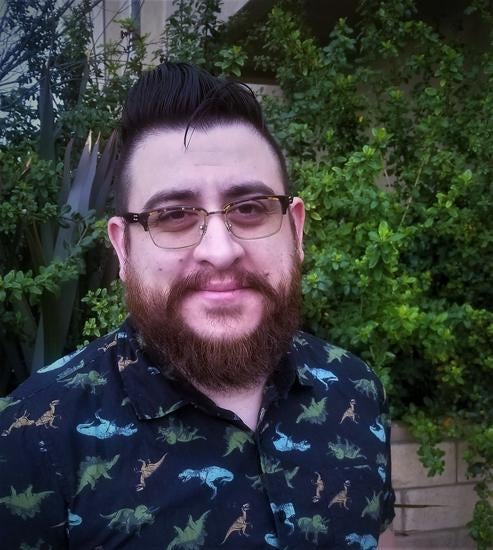When he joined the U.S. Navy in 2010, Mychal Valle didn’t think he would ever return to school. After all, he got to work on new radar technologies in the navy and got recognized for writing technical manuals. But by the time he left the navy in 2016, Valle’s service helped him discover his passion: a career in science.
Now 33, Valle graduates with a bachelor’s degree in applied physics and engineering from UC Riverside next month. He has been accepted into the UCLA Physics Bridge Program, giving him two years of full funding beginning this fall for a master’s level program in physics and automatic enrollment as a doctoral student at UCLA after passing the comprehensive exam.
UCLA for graduate studies. (Timothy Baker)
“Mychal is an exceptionally deserving candidate for the bridge program,” said Flip Tanedo, an assistant professor of physics and astronomy at UCR, who has known Valle for almost two years as an informal mentor. “He has ‘fallen through the cracks’ in multiple ways in his academic career, but each time has risen to the occasion. Nontraditional in many ways, Mychal is a student who has the grit and fortitude to succeed against challenges far beyond those of the typical doctoral degree applicant.”
Valle took John Barton’s computational physics course at UCR in fall 2020.
“Mychal has a very deep curiosity about science and a drive to understand complicated topics completely,” said Barton, an assistant professor of physics and astronomy. “He has a very independent and self-motivated approach to problem solving that will be really helpful in graduate studies. It was a pleasure to have him in the course.”
Valle transferred to UCR from Pasadena City College, or PCC, in 2019. A first-generation Latino college student, he tutored his mother in math for her GED. Growing up with his maternal grandparents, he is the oldest of four children and sacrificed extracurricular activities in school to take care of his siblings. In high school, he had to be emotionally and financially independent while helping support the family to make ends meet.
“I took on three jobs while attending community college to help with the family’s finances,” Valle said. “Much of my time then was spent caring for my siblings. When I couldn’t balance these jobs, attend to my siblings, and finish my college degree, I decided to join the navy and use the GI Bill to support my future studies.”
When he joined PCC in fall 2016, academia struck him as a new and overwhelming experience. Transitioning from the military to community college came with challenges. The structural framework of academia was unfamiliar to him, and he often felt he was starting from the bottom. He wasn’t sure what questions to ask, or of whom. When UCR and Cal Poly San Luis Obispo admitted him as a transfer student, he chose UCR because he felt the university’s reputation as a research institution could augment his chances of getting into graduate school. But only months after he joined UCR, the COVID-19 pandemic disrupted his educational experience.
“Most of my time was spent doing distance learning,” Valle said. “The course work was difficult. I did not know what to ask my professors or how to approach them. I had no reference for this navigation. That can be daunting and overwhelming. Coming from a strong Hispanic culture, reaching out for help is not always the easy thing to do. So I hung out with peers who seemed to know more than I did.”
Fortunately, he learned about the American Physical Society Bridge Program, a postbaccalaureate program lasting one to two years that provides students with research experience, advanced coursework, and coaching to prepare them for a graduate school application. The program — UCR is a member institution — aims to increase the number of physics doctoral degrees awarded to underrepresented minority students. Valle qualified to participate in the program. His application to graduate schools got him seven APS Bridge Program offers, including from UCLA, the University of Central Florida, and the University of Texas at Arlington — his top three choices.
“Part of Mychal’s service in the navy was spent working with new technologies while deployed in San Diego and Honolulu,” Tanedo said. “His work touched on radio frequency communication, plasmas, and photons, and his talent for science elevated him to a position that exposed him to technical work. The fact that he was tasked with writing technical manuals demonstrates a knack for science communication and a careful attention to detail that are key skills for doctoral students.”
Tanedo is proud of the Department of Physics and Astronomy’s success the last few years with Bridge program placements.
“Mychal joins a group of fantastic recent UCR physics students who have gone on to Bridge programs, such as Everado Molina, who joined Cal State Long Beach; Jesus Negrete, who joined the University of Hawaii at Manoa; and Franco Iglesias, who joined Cal State Los Angeles.”
Valle, whose primary interests are in atomic, molecular, and optical physics, said he doesn’t fully know what a doctoral degree demands or what doors it might open for him.
“That, though, is my biggest driver: finding out,” he said. “There is so much for me to understand; walking that path of knowledge is exciting to me. My advice to students who are struggling in school, as I still do, is to know that it is OK now and then to stop everything and turn introspective. When you tire of climbing the mountain, it’s OK to pause and take a look at how far you have journeyed uphill.”
